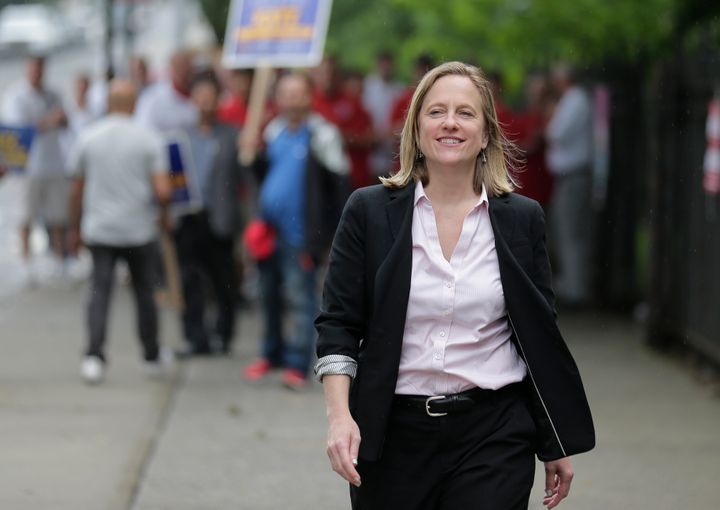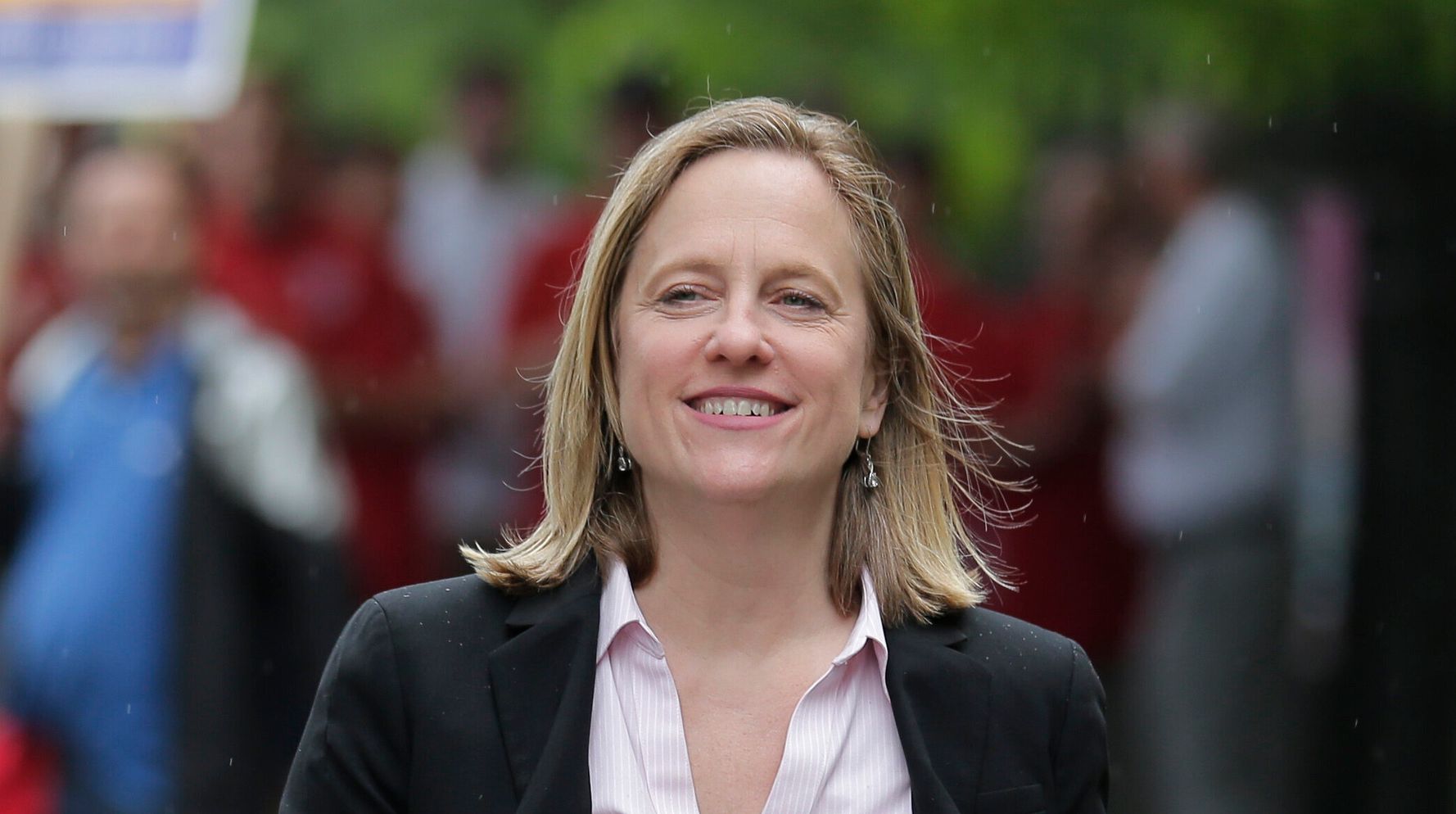[ad_1]
QUEENS, N.Y. ― Queens Borough President Melinda Katz won the Democratic nomination for district attorney of Queens, following a prolonged recount and court battle that came to a close on Tuesday.
Tiffany Cabán, 32, a queer Latina public defender who enjoyed the backing of Queens’ nascent activist left, led Katz at the end of Election Day on June 25.
But a little over a week later, Katz, 53, narrowly overtook Cabán when all of the absentee ballots were counted. Katz’s narrow margin then prompted a full manual recount, which she proceeded to win by a 60-vote margin on July 26.
Cabán nonetheless fought on, challenging the New York City Board of Elections’ invalidation of a number of affidavit ballots ― those granted to voters without proper proof of party registration. But after a hearing in Queens on Tuesday in which a judge upheld many of the invalidations, Cabán and her team determined that her path to victory was perilously narrow ― if not impossible. She decided that she would not pursue additional legal action.

In front of a crowd of supports at a bar in her home neighborhood of Astoria, Cabán formally conceded the race to Katz. Her supporters, including a number of progressive lawmakers and activists arrayed behind her, interrupted her with chants of “Tiff-an-y.”
Cabán treated the occasion as a bittersweet affair, spending far more time discussing the ways in which her campaign had broken new ground, shifted the Democratic Party to the left and exposed flaws in New York’s election system, than on the task at hand. When she finally arrived at her concession, she did not so much as mention Katz.
“This election may be over, but the organizing does not stop, it will not stop,” she declared.
Katz is due to face Republican attorney Daniel Kolgan in November.
In heavily Democratic Queens, where the general election is widely viewed as a formality, Katz’s primary win virtually ensures that she will take the helm of one of the country’s most powerful prosecutor’s offices.
Katz’s victory, so many weeks after Cabán’s celebratory election night, is a demoralizing blow to the borough’s left-wing groups, which rallied behind public defender Cabán in the hopes of repeating an upset of the kind Alexandria Ocasio-Cortez pulled off in June 2018.
But Cabán’s supporters depicted the narrow loss as a sign of the Queens Democratic Party machine’s weakness rather than its endurance.
Cabán’s bid was the beginning of a larger wave that would eventually bring about more lasting change, they argued.
“Like Tiffany said, it was never about one campaign, it was about shifting the agenda and the conversation, and we did that and we are going to continue to do it,” said New York Assemblyman Ron Kim, a Flushing Democrat who endorsed Cabán. “We normalized certain things that people never talk about during campaigns.”
Kim singled out Cabán’s advocacy for the decriminalization of sex work. Cabán sought the support of and actively campaigned with sex workers ― a previously unheard-of gesture for a would-be prosecutor that brought national attention to the effect of sex work prohibition on vulnerable women.
In part because of pressure from Cabán, Katz has promised to implement a program of incremental reform that would move the borough away from the old-fashioned, draconian approach to policing crime that it had retained years after other New York City district attorneys had revised their tactics.
“Coalition-building is the key to winning in Queens County and here, Katz and the Queens organization, together with labor proved that they were the better builders than the progressive challengers,” said Bruce Gyory, a policy consultant and adjunct professor at SUNY Albany.
Of course, the Queens machine also benefited from the kinds of heavy-handed tactics for which it has been notorious.
The Democratic-controlled New York State Legislature passed a measure this session that would soften the requirements to count affidavit ballots. But New York Assembly Speaker Carl Heastie (D), who endorsed Katz, has yet to send the bill to Gov. Andrew Cuomo’s desk to be signed into law. (Cuomo also endorsed Katz and raised money for her.)
The bill’s passage likely would have resulted in the invalidation of fewer affidavit ballots. The Cabán campaign sought to contest, largely unsuccessfully, the disqualification of 68 affidavit ballots in which voters neglected to list their party affiliation; 22 ballots cast by voters who went to the wrong polling site; and 12 ballots cast by voters that the Board of Elections had incorrectly decided were not registered.
Cuomo “and some of the other leaders in Albany are part of a larger problem that made politics so toxic,” Kim said.
Queens, a majority-minority borough of 2.3 million, has shifted leftward in recent years, but it remains a redoubt of middle-class homeowners and upwardly mobile immigrant groups ― a place where, until recently, local elections were decided in the smoke-filled rooms of one of the country’s most storied political machines.
Thanks to the machine’s backing, Richard Brown ran a tough-on-crime DA office virtually uncontested from 1991 until his death in May at age 86. The race to succeed Brown was an opportunity for the Queens establishment to reaffirm its strength after Alexandria Ocasio-Cortez’s ouster of Joseph Crowley, then-congressman and chair of the Queens County Democratic Party, in June 2018, and subsequent losses in hotly contested state senate primaries.
Rep. Gregory Meeks, Crowley’s successor as Queens party chair, New York Gov. Andrew Cuomo, as well as many of the city’s top labor unions, faith leaders and elected officials rallied behind Queens Borough President Melinda Katz’s bid for the post.
For her part, Cabán won the endorsements of Ocasio-Cortez; state Sens. Jessica Ramos and Michael Gianaris; New York City Comptroller Scott Stringer, who is expected to run for mayor in 2021; presidential contenders Bernie Sanders and Elizabeth Warren; and The New York Times editorial board.
Katz’s cash advantage and network of institutional support made her an early favorite in the race. The perceived inevitability of her victory hit its peak with a mid-June cover story about Katz in the news magazine City & State titled, “Katz in the Bag.” Rory Lancman, a city councilman who had delivered stinging criticism of Katz during his run for DA, dropped out days before the primary and to the shock of many poll watchers, including his disappointed chief of staff, endorsed Katz.
Cabán appeared to be picking up momentum in the final days of the race, as endorsements from Sanders and Warren raised her profile. She also benefited from a savvy media operation and a formidable ground game fueled by volunteers from the Democratic Socialists of America and other left-leaning groups.
But the Queens establishment scrambled effectively to stop her. Meeks accused Sanders and Warren of being “patronizing” toward black voters for failing to consult him and other black elected officials. Crowley, now working at a top Washington lobbying firm, kicked in $12,500 for Katz, with the influential Real Estate Board of New York throwing another $28,500 Katz’s way. Katz used the cash to deploy ever-more over-the-top attacks against Cabán, such as a racially incendiary digital ad mocking Cabán’s participation in a pickup basketball game in southeast Queens.
In the end, Cabán and her movement failed to overcome the entrenched power of the borough’s political machine.
Her narrow loss is likely to be cause for some self-reflection on the left about why it has had greater difficulty winning in larger, more moderate jurisdictions with diverse constituencies.
At two polling sites in Meeks’ southeast Queens district on Election Day, some African American voters said they worried that Cabán’s positions were too extreme.
Joan Flowers, a criminal defense attorney casting her vote in St. Albans, voted for Mina Malik, a former prosecutor in Queens and Brooklyn who ran New York City’s civilian complaint review board. Malik, who got lost in the media coverage of a showdown between Katz and Cabán, quietly ran as a reformer with the experience needed to implement difficult changes.
Flowers objected to Cabán’s plans to completely decriminalize sex work, as well as the public defender’s skepticism of incarceration as a tool for crime prevention.
“As a criminal defense attorney, I understand the need for fairness, but if and when they are found guilty, they need incarceration, removal from society and after that, hopefully we can rehabilitate them,” Flowers said.
Rita Williams, a retired federal employee in St. Albans, also voted for Malik. Malik, whose husband, Derek Sells, is an African American civil rights attorney, impressed Williams when she spoke at a local church.
Coalition-building is the key to winning in Queens County and here, Katz and the Queens organization, together with labor proved that they were the better builders than the progressive challengers.
Bruce Gyory, a policy consultant and adjunct professor at SUNY Albany
Asked about Cabán, Williams needed a moment to place the name.
“AOC endorsed her,” she said finally with a smile. “I like AOC, but I never heard of Cabán.”
Katz plans to “fix our criminal racial justice system,” hire more diverse personnel, protect marginalized communities from hate crimes and generally take a less heavy-handed approach to prosecution. She has also pledged not to prosecute marijuana possession and end the use of cash bail for nonviolent crimes.
But the recent passage of state laws decriminalizing marijuana possession and severely restricting the use of cash bail effectively preempted the actions any DA would take. And it is unclear how forcefully someone as politically connected as Katz will impose a new culture on an office staffed by hundreds of more experienced attorneys. Although Katz touts her management chops honed over a quarter-century in public life, she does not have experience practicing criminal law.
In the near term, the clearest effect of Katz’s victory is the revival ― however faint ― of the diminished Queens machine.
Meeks, in particular, is likely to be the target of greater courtship from Democratic presidential candidates seeking to corral votes in the 2020 primary, to say nothing of Democrats preparing to run for New York City mayor in 2021.
“The coalition Meeks was able to assemble behind Katz is exactly the one you would need to carry Queens County in a presidential race, but importantly, it will be absolutely essential to winning a mayoral runoff,” Gyory said.
But Kim, who has endorsed Sen. Bernie Sanders (I-Vt.) in the presidential race, cautioned his establishment colleagues against excessive confidence.
“They need to do a lot of soul searching. I don’t know how they can possibly continue the status quo,” he said. “People want openness. People don’t want the toxic, dominating politics anymore ― especially the younger generation.”
This article has been updated with statements made during the concession speech and other details throughout.
REAL LIFE. REAL NEWS. REAL VOICES.
Help us tell more of the stories that matter from voices that too often remain unheard.
[ad_2]
Source link

